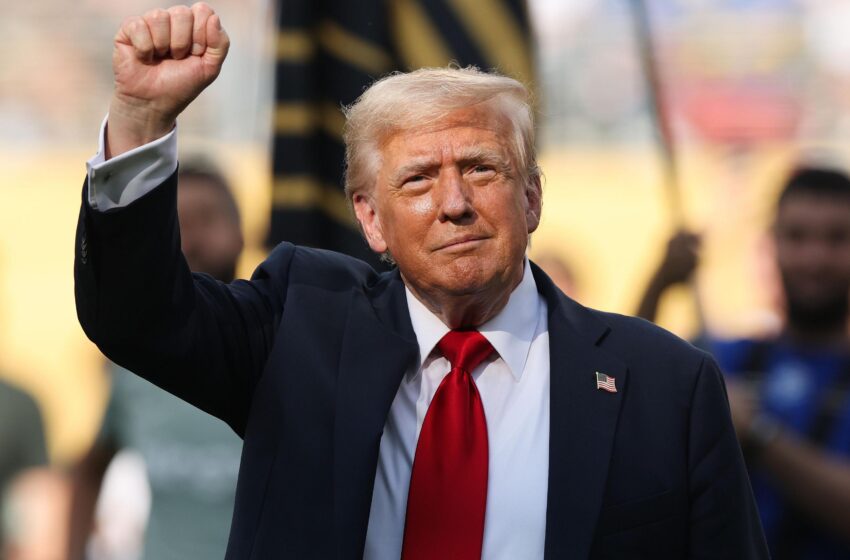Trump pushes to end Senate filibuster amid government shutdown – Will Republicans go nuclear?

Donald Trump
In a bold and controversial move, former President Donald Trump has called on Senate Republicans to completely abolish the filibuster — a longstanding Senate rule that requires 60 votes to advance most legislation. Trump’s demand, shared Thursday on his social media platform, Truth Social, came as the federal government shutdown entered its fourth week, leaving millions of Americans anxious over unpaid wages, food aid cuts, and mounting disruptions across the country.
“THE CHOICE IS CLEAR — INITIATE THE ‘NUCLEAR OPTION,’ GET RID OF THE FILIBUSTER,” Trump wrote, framing the move as the only way for Republicans to “make America great again” and reopen the government.
The statement immediately shook up negotiations on Capitol Hill, where fragile bipartisan talks were just beginning to show signs of progress. The former president’s call adds fresh tension to an already strained relationship between Senate leaders, who are split over how far to go in ending the stalemate.
What Is at Stake?
Ending the filibuster — a procedural tool that allows the minority party to block legislation by extending debate indefinitely — would fundamentally reshape the balance of power in the Senate. With the rule in place, most bills require a supermajority of 60 votes to pass. Eliminating it would mean the GOP could push legislation through with a simple majority of 50 votes, potentially ending the shutdown without Democratic support.
However, Senate Majority Leader John Thune (R-S.D.) has consistently warned that scrapping the filibuster could backfire. “It’s been a bulwark against a lot of really bad things happening in the country,” he said earlier this month, reaffirming his opposition to changing Senate rules.
Republicans currently hold a narrow majority but have struggled to secure the seven Democratic votes needed to pass a funding bill. Democrats, in turn, have withheld their support to pressure Republicans into negotiating on the renewal of Affordable Care Act tax credits — a sticking point in the broader budget fight.
Trump’s Pressure on GOP Lawmakers
Behind the scenes, sources say some Republican senators privately pleaded with Vice President JD Vance to persuade Trump to tone down his rhetoric on the filibuster. Yet, Trump doubled down after returning from a diplomatic trip to Asia, reportedly telling aides that “powerful Republicans are allowing Democrats to hold America hostage.”
The call to “play the Trump card,” as he described it, comes at a time when public frustration is boiling over. Air travel disruptions, delayed pay for federal employees, and looming cuts to SNAP food assistance programs have intensified political pressure on both parties.
While Trump argues that removing the filibuster would “immediately end this ridiculous, country-destroying shutdown,” Democrats counter that the GOP’s refusal to negotiate on healthcare subsidies and social programs is the real cause of the impasse.
A Divided Senate and Growing Consequences
Even within the Republican Party, there’s no clear consensus. Some lawmakers believe Trump’s approach risks alienating moderate senators and worsening negotiations. Others view it as a necessary “shock” to push Democrats to the table.
For now, the Senate is on recess until Monday, giving negotiators only days before the shutdown surpasses the record 35-day lapse that occurred in 2019 — also during Trump’s presidency.
Meanwhile, the economic and human toll continues to rise. Families relying on federal food aid face uncertainty as SNAP funds dry up, air traffic controllers are overworked without pay, and millions are bracing for increased health insurance premiums as subsidies near expiration.
Senator Lisa Murkowski (R-Alaska) summed up the mood bluntly: “People are stressing. We are well past time to have this behind us.”
Bottom Line
Trump’s demand to end the Senate filibuster has reignited one of Washington’s most divisive debates — whether the need for immediate government action justifies dismantling one of America’s oldest political guardrails.
While the move could hand Republicans short-term leverage, it also threatens to alter Senate traditions permanently, setting a precedent that could haunt both parties in the years ahead.
For now, the standoff continues — and the American public remains the ultimate casualty of Washington’s gridlock.
FAQ
1. What is the Senate filibuster?
The filibuster is a rule that allows senators to prolong debate and delay or block votes on legislation. It effectively requires 60 votes to advance most bills.
2. What is the “nuclear option”?
It refers to changing Senate rules to eliminate the filibuster by a simple majority vote, allowing legislation to pass with just 50 votes instead of 60.
3. Why is Trump calling for the filibuster to end?
Trump believes that removing the filibuster would allow Republicans to unilaterally pass a funding bill and end the government shutdown without Democratic support.
4. What are Senate leaders saying?
Senate Majority Leader John Thune and several others oppose the move, warning it would destroy bipartisanship and make future governance unstable.
5. What happens next?
If the impasse continues, critical federal programs — including food aid and healthcare subsidies — could face severe disruptions within days.

